 Augustis täiendasime LHV raamatukogu riiuleid finantsalase kirjandusega, mille spekter on taaskord väga lai, et igaühel oleks võimalik pimenevaid õhtupoolikuid mõne huvitava teosega sisustada. Valitud raamatutele viskame pilgu peale ka LHV ajakirja „Investeeri!“ sügiseses väljaandes.
Augustis täiendasime LHV raamatukogu riiuleid finantsalase kirjandusega, mille spekter on taaskord väga lai, et igaühel oleks võimalik pimenevaid õhtupoolikuid mõne huvitava teosega sisustada. Valitud raamatutele viskame pilgu peale ka LHV ajakirja „Investeeri!“ sügiseses väljaandes.
 Keynes: The Return of the Master (Robert Skidelsky, 2009).
Keynes: The Return of the Master (Robert Skidelsky, 2009).
Keynes's preeminent biographer, Robert Skidelsky, Emeritus Professor of Political Economy at the University of Warwick, brilliantly synthesizes from Keynes's career and life the aspects of his thinking that apply most directly to the world we currently live in. In so doing, Skidelsky shows that Keynes's mixture of pragmatism and realism – which distinguished his thinking from the neo-classical or Chicago school of economics that has been the dominant influence since the Thatcher-Reagan era and which made possible the raw market capitalism that created the current global financial crisis – is more pertinent and applicable than ever. Crucially Keynes offers nervous capitalists – and Keynes never wavered in his belief in the capitalist system – a positive answer to the 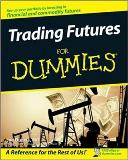 question we now face: When unbridled capitalism falters, is there an alternative?
question we now face: When unbridled capitalism falters, is there an alternative?
Trading Futures For Dummies (Joe Duarte MD, 2008)
Want to take advantage of the futures market? This plain-English guide gives you the surefire strategies you need to be a successful trader, with up-to-the-minute advice on the various types of futures, conducting research, finding a broker, entering and exiting positions, and minimizing your losses. You also get bearish 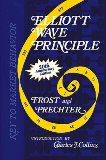 and bullish strategies and tips for trading online.
and bullish strategies and tips for trading online.
Elliott Wave Principle: Key To Market Behavior (A.J. Frost, Robert R. Prechter, 2005).
A Great Classic for Three Decades: Now In Its 10th Edition, Consider What This "Definitive Text" Offers You Take a moment to look over your books about investing. Have any of them given you a successful method for making profits and reducing risks? Is there even one such book that has proven reliable over the years? Alas, most investors would say "no." That's because so few investment books are "classic" in the true sense: For years investors keep buying the book, and they keep using the method to make the most of their opportunities.
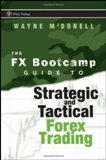 The FX Bootcamp Guide to Strategic and Tactical Forex Trading (Wayne McDonell, 2008)
The FX Bootcamp Guide to Strategic and Tactical Forex Trading (Wayne McDonell, 2008)
Written by Wayne McDonell, the Chief Currency Coach at FX Bootcamp, this book shows readers how to successfully trade the Forex market on their own. FX Bootcamp's Guide to Strategic and Tactical Forex Trading skillfully explains how to combine popular technical indicators to formulate a comprehensive market strategy. Readers will then learn how to focus on using this information to create a tactical trading plan--one that will help them pull the trigger to get in and out of a trade. Along the way, McDonell takes the time to discuss the various challenges a Forex trader faces, such as greed, fear, loss, and isolation. As a Forex trader and educator of traders, Wayne McDonell knows what it takes to make it in the competitive world of Forex. And with FX Bootcamp's Guide to Strategic and Tactical Forex Trading he shows readers how.
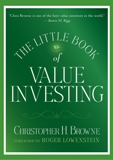 The Little Book of Value Investing (Little Books. Big Profits) (Christopher H. Browne, 2006)
The Little Book of Value Investing (Little Books. Big Profits) (Christopher H. Browne, 2006)
Browne's experience as managing director of investment firm Tweedy, Browne provides examples to support his lessons on value investing, a method of buying stocks that have fallen in price to earn the best return over the long term. Browne uses examples from successful investors (such as Benjamin Graham, Walter Schloss and Warren Buffet) to illustrate that value investing is the best way to make the most of one's investments. The zingy chapters titles ("Buy Stocks like Steaks...On Sale," "Around the World with 80 Stocks" and "Sifting out the Fool's Gold") are demonstrative of his penchant for metaphors, parables and anecdotes, which make this book as entertaining as it is informative. Browne's short chapters detail useful and time-tested concepts, including the significance of book value, which foreign economies are worth investing in, and who to watch for investment 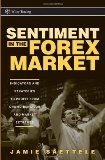 ideas.
ideas.
Sentiment in the Forex Market: Indicators and Strategies To Profit from Crowd Behavior and Market Extremes (Jamie Saettele, 2008)
Crowds move markets and at major market turning points, the crowds are almost always wrong. When crowd sentiment is overwhelmingly positive or overwhelmingly negative ? it's a signal that the trend is exhausted and the market is ready to move powerfully in the opposite direction. Sentiment has long been a tool used by equity, futures, and options traders.
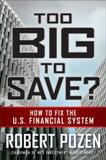 Too Big to Save? How to Fix the U.S. Financial System (Robert Pozen, 2009)
Too Big to Save? How to Fix the U.S. Financial System (Robert Pozen, 2009)
The recent credit crisis and the resulting bailout program are unprecedented events in the financial industry. While it's important to understand what got us here, it's even more important to consider how we should get out. While there is little question that immediate action was required to stabilize the situation, it is now time to look for a long-term plan to reform the United States financial industry. That is where Bob Pozen comes in. Perhaps more than anyone in the industry, Pozen commands the respect and attention of the public and private sector. In this timely guide, he outlines his vision for the new financial future and provides actionable advice along the way.
 No One Would Listen: A True Financial Thriller (Harry Markopolos, 2010)
No One Would Listen: A True Financial Thriller (Harry Markopolos, 2010)
No One Would Listen is the exclusive story of the Harry Markopolos-lead investigation into Bernie Madoff and his $65 billion Ponzi scheme. While a lot has been written about Madoff's scam, few actually know how Markopolos and his team-affectionately called "The Fox Hounds" by Markopolos himself, uncovered what Madoff was doing years before this financial disaster reached its pinnacle. Unfortunately, no one listened, until the damage of the world's largest financial fraud ever was irreversible. Throughout the book, Markopolos and his Fox Hounds tell their first-hand story of investigating Madoff-with the help of bestselling author David Fisher. They explain how they discovered the fraud, and then how they provided credible and detailed evidence to major newspapers and the Securities and Exchange Commission (SEC) many times between 2000 and 2008,  only to have his warnings ignored repeatedly by the SEC.
only to have his warnings ignored repeatedly by the SEC.
How an Economy Grows and Why It Crashes (Peter D Schiff, Andrew J. Schiff, 2010)
How an Economy Grows and Why it Crashes uses illustration, humor, and accessible storytelling to explain complex topics of economic growth and monetary systems. In it, economic expert and bestselling author of Crash Proof, Peter Schiff teams up with his brother Andrew to apply their signature "take no prisoners" logic to expose the glaring fallacies that have become so ingrained in our country’s economic conversation.
The Men Who Would Be King: An Almost Epic Tale of Moguls, Movies, and a Company Called DreamWorks 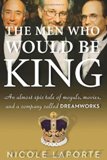 (Nicole LaPorte, 2010)
(Nicole LaPorte, 2010)
The rise and then the crash and burn of DreamWorks, created by three of the biggest egos in Hollywood—Steven Spielberg, Jeffrey Katzenberg, and David Geffen—is a gripping saga of changing economic times. Wary of corporate inroads and catalyzed by Katzenberg’s troubled departure from Disney, the three had independently come to a point where they wanted to run their own show. In 1994, without even a name for their venture, they announced the formation of a company that would break the mold on corporate ownership of entertainment-making, respecting creativity above all else. Spielberg was coddled and cosseted as the ultimate artiste. Katzenberg, who headed the animation division at Disney, was motivated as much by vengeance against CEO Michael Eisner when he set about luring away Disney’s animators. Billionaire Geffen was looked on as the businessman who would bring together disparate parts of the company. What followed was a clash of multiple cultures and 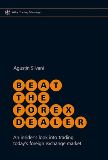 visions, within and outside of DreamWorks.
visions, within and outside of DreamWorks.
Beat the Forex Dealer: An insider's look into trading today's foreign exchange market (Augustin Silvani, 2008)
The foreign-exchange market is often referred to as the Slaughterhouse where novice traders go to get 'chopped up'. It is one of egos and money, where millions of dollars are won and lost every day and phones are routinely thrown across hectic trading desks. This palpable excitement has led to the explosion of the retail FX market, which has unfortunately spawned a new breed of authors and gurus more than happy to provide misleading and often downright fraudulent information by promising traders riches while making forex trading 'easy'.
The Checklist Manifesto: How to Get Things Right (Atul Gawande, 2009)
That humblest of quality-control devices, the checklist, is the key to taming a high-tech economy, argues this 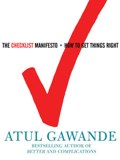 stimulating manifesto. Harvard Medical School prof and New Yorker scribe Gawande (Complications) notes that the high-pressure complexities of modern professional occupations overwhelm even their best-trained practitioners; he argues that a disciplined adherence to essential procedures—by ticking them off a list—can prevent potentially fatal mistakes and corner cutting. He examines checklists in aviation, construction, and investing, but focuses on medicine, where checklists mandating simple measures like hand washing have dramatically reduced hospital-caused infections and other complications. Gawande gets slightly intoxicated over checklists, celebrating their most banal manifestations as promethean breakthroughs (First there was the recipe, the most basic checklist of all, he intones in a restaurant kitchen). He's at his best delivering his usual rich, insightful reportage on medical practice, where checklists have the subversive effect of puncturing the cult of physician infallibility and fostering communication and teamwork. (After writing a checklist for his specialty, surgery, he is chagrined when it catches his own disastrous lapses.) Gawande gives a vivid, punchy exposition of an intriguing idea: that by-the-book routine trumps individual prowess
stimulating manifesto. Harvard Medical School prof and New Yorker scribe Gawande (Complications) notes that the high-pressure complexities of modern professional occupations overwhelm even their best-trained practitioners; he argues that a disciplined adherence to essential procedures—by ticking them off a list—can prevent potentially fatal mistakes and corner cutting. He examines checklists in aviation, construction, and investing, but focuses on medicine, where checklists mandating simple measures like hand washing have dramatically reduced hospital-caused infections and other complications. Gawande gets slightly intoxicated over checklists, celebrating their most banal manifestations as promethean breakthroughs (First there was the recipe, the most basic checklist of all, he intones in a restaurant kitchen). He's at his best delivering his usual rich, insightful reportage on medical practice, where checklists have the subversive effect of puncturing the cult of physician infallibility and fostering communication and teamwork. (After writing a checklist for his specialty, surgery, he is chagrined when it catches his own disastrous lapses.) Gawande gives a vivid, punchy exposition of an intriguing idea: that by-the-book routine trumps individual prowess
 The Facebook Effect: The Inside Story of the Company That Is Connecting the World (David Kirkpatrick, 2010)
The Facebook Effect: The Inside Story of the Company That Is Connecting the World (David Kirkpatrick, 2010)
There's never been a Web site like Facebook: more than 350 million people have accounts, and if the growth rate continues, by 2013 every Internet user worldwide will have his or her own page. And no one's had more access to the inner workings of the phenomenon than Kirkpatrick, a senior tech writer at Fortune magazine. Written with the full cooperation of founder Mark Zuckerberg, the book follows the company from its genesis in a Harvard dorm room through its successes over Friendster and MySpace, the expansion of the user base, and Zuckerberg's refusal to sell. The author is at his best discussing the social implications of the site, from the 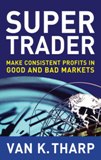 changing notions of privacy to why and how people use Facebook—increasingly it's to come together around a common interest or cause (the eponymous Facebook Effect).
changing notions of privacy to why and how people use Facebook—increasingly it's to come together around a common interest or cause (the eponymous Facebook Effect).
Super Trader: Make Consistent Profits in Good and Bad Markets (Van Tharp, 2009)
How do you transform yourself from mild-mannered investor to Super Trader? Think clearly. Plan accordingly. Commit completely. In other words, become a trader. And no one is better suited to help you make the transformation than legendary trading educator and author Van K. Tharp.
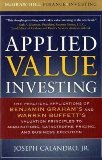 Applied Value Investing: The Practical Application of Benjamin Graham and Warren Buffett's Valuation Principles to Acquisitions, Catastrophe Pricing and Business Execution (Jr. Joseph Calandro, 2009)
Applied Value Investing: The Practical Application of Benjamin Graham and Warren Buffett's Valuation Principles to Acquisitions, Catastrophe Pricing and Business Execution (Jr. Joseph Calandro, 2009)
Over the years, numerous books have been published on Benjamin Graham’s approach. Most of these books present different interpretations of value investing and are generally introductory based. Until now, there has not been an advanced hands-on guide for investors and executives who may want to apply the powerful value investing discipline outside of stocks and bonds. Applied Value Investing takes the same time-proven approach Graham introduced with David Dodd in their 1934 masterpiece, Security Analysis, and extends it in a variety of unique and practical ways—including mergers and acquisitions, alternative investments, and financial strategy.
The Way We're Working Isn't Working: The Four Forgotten Needs That Energize Great Performance (Tony Schwartz, Jean 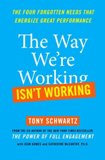 Gomes, Catherine McCarthy Ph.D., 2010)
Gomes, Catherine McCarthy Ph.D., 2010)
Schwartz, CEO of the Energy Project, stretches an obvious thesis to the breaking point in his plaint on how the American workplace—theoretically where technology has allowed us to reach for more, bigger, faster—has bred an atmosphere in which workers have become disengaged from their work. We fail to take care of ourselves, he points out, and end up undermining our health, happiness, and productivity. Using a series of quadrants describing the emotional workings of both employees and companies, he argues that nothing is gained—and much is lost—by constantly pushing people to achieve more and more in less time and with fewer resources; rejuvenation and rest are necessary for creative breakthroughs and broader perspectives. All well and good, but the bulk of the book is then eaten up exhorting readers to get more sleep, exercise, eat better, and take care of their emotional health. While a reminder to cultivate engagement and mindfulness is always relevant to the modern business reader, 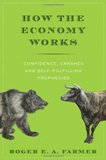 the usable content is slim—and fluffed out beyond the point of readability.
the usable content is slim—and fluffed out beyond the point of readability.
How the Economy Works: Confidence, Crashes and Self-Fulfilling Prophecies (Roger E.A. Farmer, 2010)
Farmer explains the differences between classical and Keynesian economics and shows how they influenced the policy debate that developed after the 2007 world financial crisis began and exploded into a global disaster, with the collapse in the U.S. of Lehman Brothers in the fall of 2008. Along with a history of economic thought from 1776 to the present (noting it is incomplete), the author offers his suggestions for preventing future financial crises.
The Greatest Trade Ever: The Behind-the-Scenes Story of How John Paulson Defied Wall Street and Made Financial History (Gregory Zuckerman, 2009)
In 2006, hedge fund manager John Paulson realized something few others suspected--that the housing market and the value of subprime mortgages were grossly inflated and headed for a major fall. Paulson's background 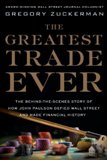 was in mergers and acquisitions, however, and he knew little about real estate or how to wager against housing. He had spent a career as an also-ran on Wall Street. But Paulson was convinced this was his chance to make his mark. He just wasn't sure how to do it. Colleagues at investment banks scoffed at him and investors dismissed him. Even pros skeptical about housing shied away from the complicated derivative investments that Paulson was just learning about. But Paulson and a handful of renegade investors such as Jeffrey Greene and Michael Burry began to bet heavily against risky mortgages and precarious financial companies. Timing is everything, though. Initially, Paulson and the others lost tens of millions of dollars as real estate and stocks continued to soar. Rather than back down, however, Paulson redoubled his bets, putting his hedge fund and his reputation on the line. In the summer of 2007, the markets began to implode, bringing Paulson early profits, but also sparking efforts to rescue real estate and derail him. By year's end, though, John Paulson had pulled off the greatest trade in financial history, earning more than $15 billion for his firm--a figure that dwarfed George Soros's billion-dollar currency trade in 1992. Paulson made billions more in 2008 by transforming his gutsy move. Some of the underdog investors who attempted the daring trade also reaped fortunes. But others who
was in mergers and acquisitions, however, and he knew little about real estate or how to wager against housing. He had spent a career as an also-ran on Wall Street. But Paulson was convinced this was his chance to make his mark. He just wasn't sure how to do it. Colleagues at investment banks scoffed at him and investors dismissed him. Even pros skeptical about housing shied away from the complicated derivative investments that Paulson was just learning about. But Paulson and a handful of renegade investors such as Jeffrey Greene and Michael Burry began to bet heavily against risky mortgages and precarious financial companies. Timing is everything, though. Initially, Paulson and the others lost tens of millions of dollars as real estate and stocks continued to soar. Rather than back down, however, Paulson redoubled his bets, putting his hedge fund and his reputation on the line. In the summer of 2007, the markets began to implode, bringing Paulson early profits, but also sparking efforts to rescue real estate and derail him. By year's end, though, John Paulson had pulled off the greatest trade in financial history, earning more than $15 billion for his firm--a figure that dwarfed George Soros's billion-dollar currency trade in 1992. Paulson made billions more in 2008 by transforming his gutsy move. Some of the underdog investors who attempted the daring trade also reaped fortunes. But others who 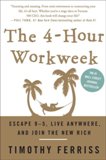 got the timing wrong met devastating failure, discovering that being early and right wasn't nearly enough.
got the timing wrong met devastating failure, discovering that being early and right wasn't nearly enough.
The 4-Hour Workweek, Expanded and Updated: Expanded and Updated, With Over 100 New Pages of Cutting-Edge Content (Timothy Ferriss, 2009)
Forget the old concept of retirement and the rest of the deferred-life plan–there is no need to wait and every reason not to, especially in unpredictable economic times. Whether your dream is escaping the rat race, experiencing high-end world travel, earning a monthly five-figure income with zero management, or just living more and working less, The 4-Hour Workweek is the blueprint.
The Great Equations: Breakthroughs in Science from Pythagoras to Heisenberg (Robert P. Crease, 2010)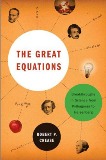 Although most people can recite Einstein's famous little equation, even if we don't know quite what it means, who has heard of the 18th-century mathematician Leonhard Euler, let alone know anything at all about his famous equation? Crease, a Stony Brook philosophy professor and popular science writer, has already taken on the ten most beautiful experiments in science in The Prism and the Pendulum, and in this enjoyable book he explores 10 rather beautiful equations. He begins with the beguiling simplicity of the equation that bears Pythogoras' name (although he says the Greek wasn't the first to discover it) and moves on to Newton's second law of motion and law of universal gravitation, the second law of thermodynamics, Maxwell's celebrated equations, discoveries by Einstein and Schrödinger and, finally, Heisenberg's famous uncertainty principle. Crease explains the significance of each of these formulas for science and, in brief interludes between chapters, explores the journeys these scientists took from ignorance to knowledge, and the social lives of their theories—their impact on the larger culture. Any reader who aspires to be scientifically literate will find this a good starting place.
Although most people can recite Einstein's famous little equation, even if we don't know quite what it means, who has heard of the 18th-century mathematician Leonhard Euler, let alone know anything at all about his famous equation? Crease, a Stony Brook philosophy professor and popular science writer, has already taken on the ten most beautiful experiments in science in The Prism and the Pendulum, and in this enjoyable book he explores 10 rather beautiful equations. He begins with the beguiling simplicity of the equation that bears Pythogoras' name (although he says the Greek wasn't the first to discover it) and moves on to Newton's second law of motion and law of universal gravitation, the second law of thermodynamics, Maxwell's celebrated equations, discoveries by Einstein and Schrödinger and, finally, Heisenberg's famous uncertainty principle. Crease explains the significance of each of these formulas for science and, in brief interludes between chapters, explores the journeys these scientists took from ignorance to knowledge, and the social lives of their theories—their impact on the larger culture. Any reader who aspires to be scientifically literate will find this a good starting place.
Freefall: America, Free Markets, and the Sinking of the World Economy (Joseph E. Stiglitz, 2010)
Written by a Nobel Prize recipient, a graduate of President Bill Clinton’s Council of Economic Advisors, and a 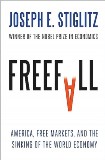 stout advocate of Keynesian economics, this inquest into the recession of 2007–09 lashes many designated villains, banks above all. Writing in a spirit Andrew Jackson would have loved, Stiglitz assails financial institutions’ size, their executive compensation, the complexity of their financial instruments, and the taxpayer money that has been poured into them. But unlike Jackson, who didn’t understand a thing about economics, Stiglitz is a little more analytical. He dwells on incentives—perverse, in his argument—for risky financial legerdemain in housing mortgages. The temptations stemmed from deregulation of the financial industry, a Reaganesque policy Stiglitz rebukes: he favors re-regulation and more government involvement in the economy. In fact, Stiglitz waxes unhappily about the Obama administration’s interventions, which thus far have been inadequate in his view. Zinging the Federal Reserve for good measure, Stiglitz insistently and intelligently presses positions that challenge those of rightward-leaning economists upholding the virtues of markets. Amid animated contemporary economic debate, Stiglitz’s book will attract popular and professional attention. --Gilbert Taylor.
stout advocate of Keynesian economics, this inquest into the recession of 2007–09 lashes many designated villains, banks above all. Writing in a spirit Andrew Jackson would have loved, Stiglitz assails financial institutions’ size, their executive compensation, the complexity of their financial instruments, and the taxpayer money that has been poured into them. But unlike Jackson, who didn’t understand a thing about economics, Stiglitz is a little more analytical. He dwells on incentives—perverse, in his argument—for risky financial legerdemain in housing mortgages. The temptations stemmed from deregulation of the financial industry, a Reaganesque policy Stiglitz rebukes: he favors re-regulation and more government involvement in the economy. In fact, Stiglitz waxes unhappily about the Obama administration’s interventions, which thus far have been inadequate in his view. Zinging the Federal Reserve for good measure, Stiglitz insistently and intelligently presses positions that challenge those of rightward-leaning economists upholding the virtues of markets. Amid animated contemporary economic debate, Stiglitz’s book will attract popular and professional attention. --Gilbert Taylor.
Delivering Happiness: A Path to Profits, Passion, and Purpose (Tony Hsieh, 2010)
Zappos CEO Hsieh offers a compelling account of his transformation from callow Harvard student entrepreneur 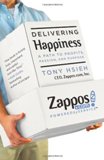 through his years as a dot-com wunderkind to the creator of a formidable brand. Interest might flag as Hsieh, fresh off selling his Internet company LinkExchange to Yahoo in 1999 for $265 million, kvetches about lacking fulfillment. But as the tech boom bursts, and Hsieh confronts his dwindling investments, his story comes alive. As the funding for his incubator companies dries up and one of his most promising startups, Zappos.com, a shoe retailer, seems doomed, Hsieh blossoms into a mature businessperson, slashing expenses and presciently making customer service the essence of the company's brand. The story becomes suspenseful as Hsieh recounts the stress of operating in survival mode, liquidating his assets to fund the company in its darkest days and seeking out an 11th-hour loan. By the time Zappos is acquired by Amazon for more than $1.2 billion in 2009, Hsieh and his team had built a unique corporate culture dedicated to employee empowerment and the promise of delivering happiness though satisfied customers and a valued workforce. An uplifting tale of entrepreneurial success, personal growth, and redemption.
through his years as a dot-com wunderkind to the creator of a formidable brand. Interest might flag as Hsieh, fresh off selling his Internet company LinkExchange to Yahoo in 1999 for $265 million, kvetches about lacking fulfillment. But as the tech boom bursts, and Hsieh confronts his dwindling investments, his story comes alive. As the funding for his incubator companies dries up and one of his most promising startups, Zappos.com, a shoe retailer, seems doomed, Hsieh blossoms into a mature businessperson, slashing expenses and presciently making customer service the essence of the company's brand. The story becomes suspenseful as Hsieh recounts the stress of operating in survival mode, liquidating his assets to fund the company in its darkest days and seeking out an 11th-hour loan. By the time Zappos is acquired by Amazon for more than $1.2 billion in 2009, Hsieh and his team had built a unique corporate culture dedicated to employee empowerment and the promise of delivering happiness though satisfied customers and a valued workforce. An uplifting tale of entrepreneurial success, personal growth, and redemption.
Tweet